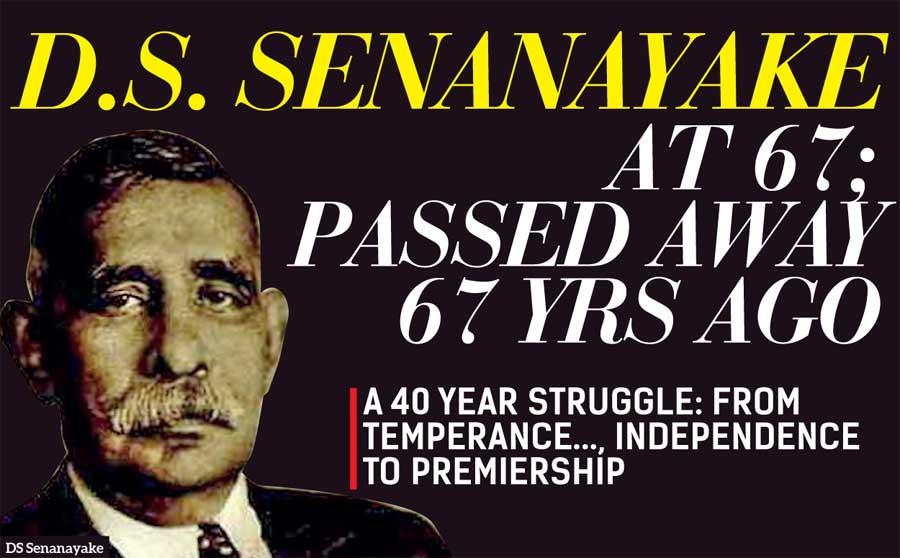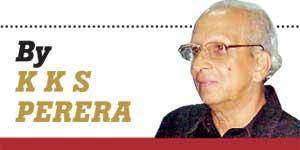Reply To:
Name - Reply Comment
Last Updated : 2024-04-18 11:50:00

Young Don Stephen (DS) and his two brothers FR and DC inspired by Buddhism and anti-colonialism were connected with the ‘Temperance Movement of Ceylon’ which was formed in 1912. The movement also played a leading role in the Independence Movement. In 1914, as the First World War was declared, the three brothers FR, DS and DC joined ‘Colombo Town Guard’, a regiment linked with Ceylon Defence Force.
Sir Robert Chalmers, the then British Governor held the Temperance Movement as rebellious and during the 1915 Sinhala-Muslim riots, the brothers along with many others leaders were jailed without any charges. The colonial rulers resorted to brutal action in the guise of suppressing the riots. 
DS was convinced that the future prosperity of Sri Lanka depended on the growth of the nation’s agriculture. One of his greatest achievements under the rebuilding of ancient irrigation schemes and reclaiming of the dry zone, is the scheme he initiated in Polonnaruwa. The main requirement in this task was the renovation of the Parakrama Samudraya.
During 1915 communal riots, under the orders of Chalmers, the ruthless Governor, the 30 year-old DS was unfairly and unjustly arrested along with his two brothers and a host of other temperance movement leaders on trumped up charges of involvement in riots: In his statement to the authorities, after the arrest, young DS said, “..., A town guard came to my residence around 5.30 am along with two armed Punjabi soldiers, woke me up and without allowing me to go to the toilet,.., took me to Welikade prison and put me in a cell where I had no place to sit. We were in solitary imprisonment with no one to talk to, a servant pushed some food in an unclean tin plate. I stayed hungry for two days...., I was charged for instigating riots, there was no evidence to prove the charge...”
SWRD’s maternal uncle S C Obeysekara, who was a member of Legislative Council in 1915, speaking at the debate on Riots, referred to Senanayakes and made a contemptuous comment,
“…the poor farmers and villagers have been deluded into this trap for personal aggrandisement of a few who are ‘nobodies’, but hope to make ‘somebodies’ of themselves by such disgraceful tactics” -:Hansard--August 11;1915 Fo.442
Sir Ivor Jennings, Former Vice Chancellor of Peradeniya University, writing on Senanayake and Independence, says, that a good number of the agitations for independence by others in 1930s have been on the wrong lines. He was discussing DS’s routing of the nation towards independence from British colonial rule in 1948. Jennings wrote, “A colony can obtain Independence by force or persuasion. But effective non-cooperation leads necessarily to force, as Mahatma Gandhi discovered” We gained Independence without shedding blood. Lord Soulbury, Governor-General of Ceylon, 1949-54, writing on “Senanayake the Man” says, “…there was the possibility that we might be deprived of the opportunity to carry out our terms of reference. That such a step was not taken was largely due to the strength and wisdom of DS, and. If he had not lived, the history of Ceylon would have been very different.” :Pge- 62.Soulbury continues,“We did not always agree., and yet looking backwards I think that when we differed he was much more often right than wrong.”
Commonwealth’s economic condition was in dire straits in early 1949; they tried to enforce authority over former colony by making a deliberate effort to manipulate our Dollar Reserves by making us a signatory to the ‘Sterling Assets Agreement’. Prime Minister, Senanayake, in this grave issue, abundantly demonstrated his patriotism. The conflict that arose with the British authorities resulted in a delegation led by Finance Minister, J. R. Jayewardene with his adviser John Exeter, [later the first Central Bank Governor], attending a Commonwealth Finance Minister’s Conference summoned by Briton. DS was very much worried over our dollar earnings; he sought to maintain it as our own foreign assets and advised the delegation as above, on the course of action if the British authorities rejected their plea.
“We are an independent state. Our dollar earnings belongs to us...., if we are not permitted to act independently then evidently we must depart the ‘Sterling Area...’, the UK Government cannot resist this. Go ahead and enlighten them you will leave unless you are allowed to keep your country’s assets” - JR speeches - Presid. Arch. File 195-a.
The British getting the fullest support for the war effort from the State Council headed by Senanayake, Dominion status was promised soon after the war. No breaking the word, there came to be appointed a Commission under Viscount Soulbury. “Soulbury Constitution’ it was called, but the fact is that it was produced by Mr Senanayake”- Jennings.
DS based his thinking on Gandhian motto ‘production by masses, not mass production’; as Minister of Agriculture from 1931 to 1947 whenever he had a problem on hand, he rushed to his inherited village of Botale, or in the tranquility of Koulwewa Estate.
Reading books is not the only way of learning—DS acquired knowledge by doing things and managing, meeting people, observing them. His aim was to relieve the pressure of densely populated South and he believed that it was far better for a man to spend his life growing rice, like his ancestors had done, rather than spent his days selling cups of tea in a little boutique.
The drafting of Sri Lanka’s Independence Constitution appears relatively diluted in its nationalism. The 1948 Constitution, under which the Colonial rulers transferred powers of self rule to Ceylon, was designed mainly by the twosome D.S. Senanayake and Sir Ivor Jennings, the Constitutional expert. DS was under pressure to include a special clause for Buddhism from the leading Buddhist clergy. A few days before, the two Mahanayakes of Asgiriya and Malwatta threatened to boycott the inauguration ceremony in Kandy. Prime Minister D S did not succumb, but travelled to Kandy and convinced the two Mahanayake Theras on the importance of not introducing special provisions on protection to Buddhism in the new Constitution. He said, “If equality is a provision, then you cannot give primacy to one religion.”
DS became a member of the National Legislative Council in 1924, and in 1931 with the Donoughmore Commission reforms he became the Minister of Lands and Agriculture in the State Council. The new Minister of Lands and Agriculture spoke little, but was able to act diligently in restoring the tanks and irrigation work of the dry zone.
“The greater draw of the commercial crops, the dignity that seemed to attach to them, the relative ease with which large returns came in, blinded the wealthier Ceylonese to the dangers lying hidden beneath their glamour and drew them away from the essentially safer and sounder, though less splendid, cultivation of products to provide a direct means of sustenance to the home population. The middle classes emulated their wealthier brethren and the peasant, left to his own devices, was content to scratch the soil and receive just whatever nature provided,” :DS wrote in his book on ‘Agriculture and Patriotism’ –
“The Prime Minister very amusingly told me, how he had made a train trip to Batticaloa, many years ago as Minister of Agriculture (under Donoughmore constitution, in 1930’s) and how the train had stopped at a siding in the jungles of Minneriya. He had got down wandered off into the jungle and came across by accident the Minneriya tank, abandoned for centuries. The farmer in him had been struck immediately. He had returned to Colombo, determined to push the government to commence restoration of the tank and resettlement of dry zone.” - John Seymour in ‘Ceylon Observer’: March 24, 1952
"DS became a member of the National Legislative Council in 1924, and in 1931 with the Donoughmore Commission reforms he became the Minister of Lands and Agriculture in the State Council"
DS inaugurated the UNP [United National Party] on September 6, 1946. Speaking as the elected leader of the new Party, DS said, “Differences of Race or Creed do not count. Sinhalese or Tamil, Moor or Malay, Burgher or Eurasian, we say this is our own, our native land, Buddhist or Hindu, Muslim or Christian, we say, may our land be blessed”, continuing he said, “We admire the people of Jaffna and we need their help in building a great Ceylonese nation, we need their intelligence and entrepreneurship, their high educational attainments. We regard their long and glorious history as part of our national history.”-- Daily news of 9th Sep 1946
Relocation of landless natives in the fertile lands surrounded by the jungle in the dry zone; under well planned colonization schemes was applied by him. He was able to initiate Bakamuna, Minneriya, Minipe, Higurakkgoda, Kalawewa, and Huniluwewa schemes and settle landless farmers who were brought from the other Districts. He played an active role in effecting many important hydro-power and irrigation schemes such as Udawalawa, Inginiyagala, and Gal-Oya. DS undoubtedly the most outstanding political leader ever produced in contemporary Sri Lanka.
A little known story of DS, the schoolboy, is one as told by the late Rev, J. S. H Edirisinghe, his teachers at S. Thomas’College. When DS became a minister, the old master wrote congratulating his pupil. The reply was that, “…if that pupil had learnt a tenth of all the master had laboured to knock into his head, I should today be a better minister”.
Probably that master had a unique way of ‘knocking things into the head’ of this pupil.
On the morning of March 20th 1952, he was taking a ride on Galle Face green along with IGP, Sir Richard Aluvihare. He suffered a stroke and fell off the police mare ‘Chitra’. Born on 20th October 1884 at Botale, a village in Hapitigam Korale, Don Stephen Senanayake was 67, when he passed away 67 years ago on March 22.
Writer can be contacted at kksperera1@gmail.com

Add comment
Comments will be edited (grammar, spelling and slang) and authorized at the discretion of Daily Mirror online. The website also has the right not to publish selected comments.
Reply To:
Name - Reply Comment
On March 26, a couple arriving from Thailand was arrested with 88 live animal
According to villagers from Naula-Moragolla out of 105 families 80 can afford
Is the situation in Sri Lanka so grim that locals harbour hope that they coul
A recent post on social media revealed that three purple-faced langurs near t

10 Apr 2024
09 Apr 2024